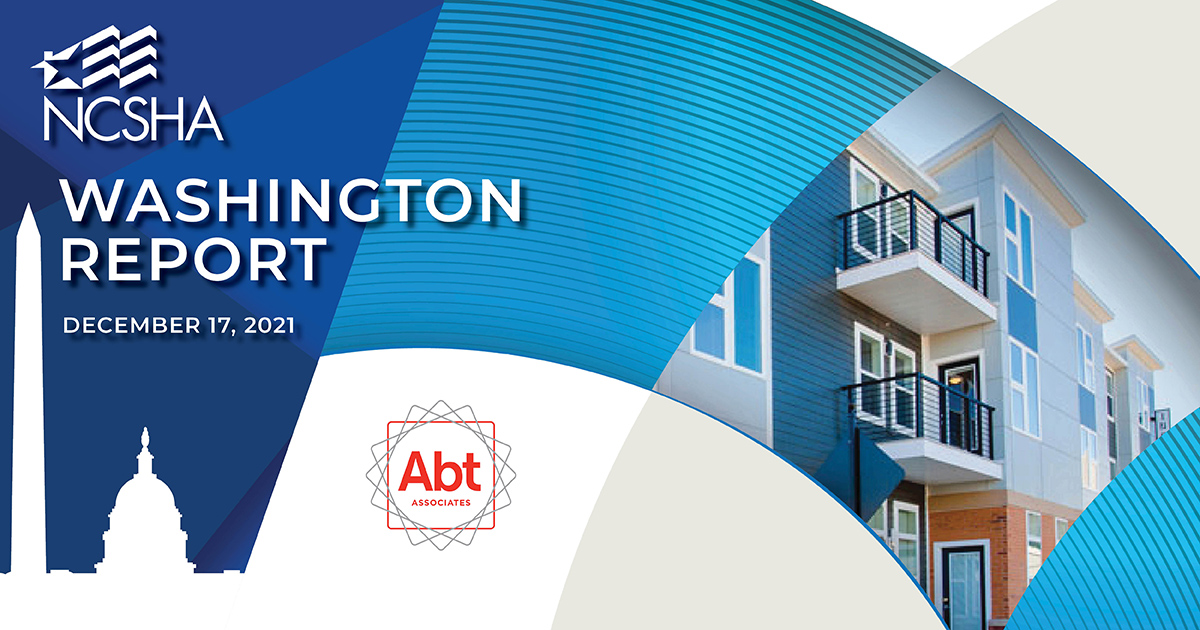NCSHA Washington Report | December 17, 2021

Every day, working people of modest means make entirely rational decisions to decline a raise, defer training, or turn down a better job because the higher income they would earn as a result would be less than the public support for their basic needs they would lose.
Social scientists call it the “benefits cliff effect.” It acts as a hidden tax on work paid by those who earn the least. It “not only discourages work, it also creates incentives for dishonesty,” argues one analyst. It’s a problem for an economy short on workers.
Benefits cliffs are common in subsidized food, health, housing, and childcare programs. Some housing programs — FHA 221(d)3 and 236, the Low Income Housing Tax Credit — avoid the problem through what David Smith calls “means-tested but not means-adjusted” rent rules.
Residents of public housing and other renters who receive Housing Choice Vouchers or Project-Based Rental Assistance can avoid the cliff and actually build assets through the Family Self-Sufficiency (FSS) program. Their housing authority or landlord establishes an escrow savings account that increases in value as each resident’s earnings, and rent contribution, increase. Participants also receive financial education and case management services.
According to the Center on Budget and Policy Priorities, “FSS is unique from many other governmental programs designed to promote work among low-income people: participation is voluntary, goals are primarily client-driven, it encourages pursuit of long-term higher earnings through education and training, and families can build substantial savings at no additional cost to them.”
FSS has flown mostly under the radar since it was created in 1990. It currently serves 74,000 households, less than four percent of the families who are eligible, according to Abt Associates. That may be about to change, for the best possible reason: hard evidence that the program works.
This fall, Abt published the latest in its series of studies of FSS. Residents who participated earned an average of $6,000 (23 percent) more and received less in cash public assistance payments than those in a control group. Every government dollar invested generated $2.25 in savings and income for program participants. An early-stage assessment suggests similar results for residents of six properties owned by Preservation of Affordable Housing.
The evidence comes from FSS programs operated by Compass Working Capital, a national nonprofit financial services organization. The organization’s incoming CEO, Markita Morris-Louis, frames FSS as a cost-effective tool to reduce “asset poverty,” which is experienced by more than half the households of color in the country. Morris-Louis’ focus on assets connects Compass’ contemporary innovations to the seminal work of Michael Sherraden, whose 1990 book Assets and the Poor shed some of the first light on benefits cliffs, poverty traps, and the necessity but insufficiency of income alone as a poverty solution.
HFAs, 13 of which already run FSS programs, have an important role to play in expanding its reach in affordable multifamily housing. Anyone unmoved by the numbers should be by the stories, like these from Alaska, Idaho, and Oklahoma.
Stockton Williams | Executive Director
Washington Report will return on January 7.
State HFA Emergency Housing Assistance
In This Issue
-
- NCSHA Welcomes New Members
- Treasury Approves More State Homeowner Assistance Fund Plans
- Senate Finance and Banking Committees Release Build Back Better Text
- OCC Issues Final Rule to Rescind 2020 Community Reinvestment Act Rule
- Thompson Nominated FHFA Director
- McCargo Confirmed as Ginnie Mae President
- Senate Banking Committee Discusses CDBG – Disaster Recovery Program
- Looking Ahead
NCSHA Welcomes New Members
These organizations have joined NCSHA as affiliate members since October: American Samoa Government Department of Commerce, Bright Power, mySidewalk, and Performance Trust Capital Partners. If you work with a partner interested in joining NCSHA, please contact Phaedra Stoger.
Treasury Approves More State Homeowner Assistance Fund Plans
On Thursday, the U.S. Department of Treasury notified two more states — Virginia and Maine — that their Homeowner Assistance Fund (HAF) plans have been approved. Virginia Housing is administering its state’s program and has been allocated $258,444,431 in total HAF funding. The Maine Bureau of Consumer Credit Protection is administering the state of Maine’s program and has been allocated $50 million.
Senate Finance and Banking Committees Release Build Back Better Text
The Senate Finance and Banking, Housing, and Urban Affairs committees both have released their portions of the legislative text of the Senate’s version of the Build Back Better (BBB) Act. With a few exceptions, both committees’ texts are mostly similar to the sections of the House-passed BBB Act crafted by their counterparts in that chamber, the Ways and Means and Financial Services committees. The most significant differences in issues of importance to NCSHA are a modification in the phase-in period of the Housing Credit program’s cap increase, with the Senate version extending the higher authority amount through 2025, rather than 2024, and greater flexibility in the Senate Finance Committee’s language than the House-passed bill for rural states in the use of the Neighborhood Homes Credit. For more information on NCSHA’s housing priorities in the Senate committees’ legislative texts, see our blog.
The Senate parliamentarian is reviewing the committees’ statutes to determine if they comply with Senate rules for reconciliation legislation. While Senate Majority Leader Charles Schumer (D-NY) had hoped to hold a vote on the Senate floor before Christmas, it is now certain the Senate will not consider it until January, as the process with the parliamentarian is ongoing and Senator Joe Manchin (D-WV) has not committed to vote for the bill and is still in talks with the White House. All 50 Democrats will need to vote in favor of the bill for it to pass.
OCC Issues Final Rule to Rescind 2020 Community Reinvestment Act Rule
The Office of the Comptroller of the Currency (OCC) on Tuesday morning issued a final rule rescinding its current Community Reinvestment Act (CRA) regulations, which were finalized in June 2020, and replacing them with the agency’s previous CRA rules. OCC now intends to work with the Federal Deposit Insurance Corporation and the Federal Reserve Board to develop common CRA rules, though a timeline for such action is uncertain. NCSHA in October sent a letter to OCC supporting the rescission of the June 2022 CRA rule, which we believe could reduce bank investments in Housing Credits, Housing Bonds, and other needed community and economic development activities. The letter also laid out NCSHA’s priorities for CRA reform. OCC’s final rule takes effect January 1.
Thompson Nominated FHFA Director
On Tuesday, President Biden announced his intention to nominate Sandra Thompson to be the director of the Federal Housing Finance Agency (FHFA). Thompson has been serving as acting director since June 23, when the president appointed her to that position. Since March 2013, she had served as deputy director of the Division of Housing Mission and Goals. In that capacity, Thompson oversaw FHFA’s housing and regulatory policy, capital policy, financial analysis, fair lending, and all mission activities for the Government-Sponsored Enterprises (GSEs). Before joining FHFA, Thompson worked at the Federal Deposit Insurance Corporation for more than 23 years. Her experience includes supervision, consumer protection, risk management, and consumer outreach.
McCargo Confirmed as Ginnie Mae President
The Senate on Tuesday voted via voice vote to confirm Alanna McCargo to serve as president of Ginnie Mae. She is expected to be sworn into the position shortly. McCargo currently serves as a senior advisor on housing finance at HUD, where she has worked with NCSHA and other housing advocates to expand affordable housing financing options. Before joining HUD, McCargo was vice president of the Urban Institute’s Housing Finance Policy Center, where she developed dozens of reports and analyses on the top issues impacting affordable homeownership lending and presented at several NCSHA events.
Senate Banking Committee Discusses CDBG – Disaster Recovery Program
The Senate Committee on Banking, Housing, and Urban Affairs held a hearing Wednesday to discuss the permanent authorization of the Community Development Block Grant Disaster Recovery Program (CDBG-DR). Since 1993, Congress has provided $95 billion for disaster aid and recovery through supplemental CDBG-DR appropriations but has not permanently authorized the program. Chairman Sherrod Brown (D-OH) said that, without permanent authorization, HUD must issue new regulations with each CDBG-DR appropriation. The resulting lack of predictability causes delays in getting the assistance to areas in need. Brown said he hopes Congress can remove this “unnecessary red tape” and make CDBG-DR a more effective program. Ranking Member Patrick Toomey (R-PA) used his opening remarks to question whether permanent authorization for CDBG-DR is necessary, pointing to the existence of permanent disaster recovery programs under the jurisdiction of agencies such as the U.S. Army Corps of Engineers and Federal Emergency Management Agency. Questions from committee members for the three witnesses from Hagerty Consulting, Opportunity Ohio, and the Brookings Institution largely followed the chairman’s and ranking member’s remarks; Democrats signaled their support for permanently authorizing the CDBG-DR program, while Republicans were skeptical about whether permanent authorization is necessary.
NCSHA, State HFA, and Industry Events
- January 10 – 14 & 24 – 28 | NCSHA’s HFA Institute 2022 | Virtual
- January 13 – 14 | Novogradac 2022 Affordable Housing Developers Conference | San Juan, PR
Jennifer Schwartz will speak at this event. - January 26 – 27 | Affordable Housing Tax Credit Coalition 2022 Annual Meeting | Austin, TX
Jennifer Schwartz will speak at this event. - February 10 – 11 | IPED’s Tax Credit Property Dispositions Conference | Philadelphia, PA
Garth Rieman will speak at this event.
Back to NCSHA Washington Report
Only members receive NCSHA Blog and Washington Report.


